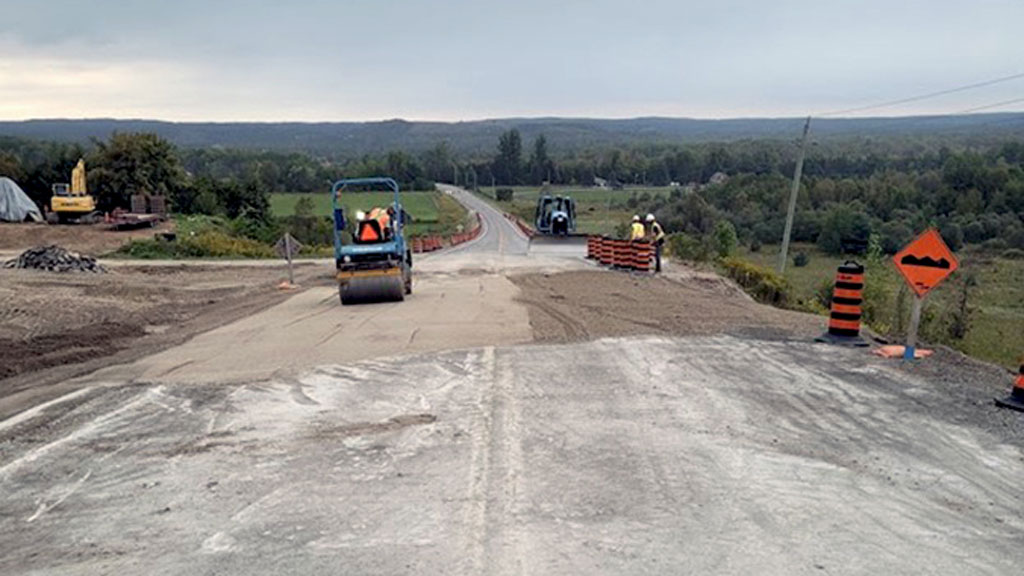Durham Region is launching the second phase of an innovative pilot this summer and plans to use a mix of recycled waste materials that includes glass and plastic to rebuild a 1.6-kilometre-long segment of Regional Road 18.
The plan calls for six tonnes of mixed plastics and 400 tonnes of recycled glass from the region’s Material Recovery Facility (MRF) to be used for the recycled part of the project, along with roughly 4.5 tonnes of polyethylene terephthalate (PET) fibres which are made from recycled plastic.
“In this project, mixed plastics sourced from the region’s MRF, and PET fibre plastics sourced from a manufacturer, will be hauled to the asphalt plant to become part of the asphalt mix that will be used for reconstruction,” explains Ramesh Jagannathan, director of transportation and field services at the region.
“Recycled glass will be sourced from the region’s MRF, washed, and crushed off-site, pulverized, and blended with the existing road base onsite to become part of the new road base.”
Subject to weather considerations, work on the road will start this summer and be completed before the end of year.
In the first phase of the pilot, a two-kilometre section of Regional Road 18 to the north was reconstructed in 2021 using conventional construction methods. The idea is to use recycled materials in the mix for paving the road between Concession Road 5 and the bridge south of Kendal and compare how the two sections of road do over time.
“The Regional Municipality of Durham is committed to a circular economy and is committed to finding innovative made-in-Durham solutions that support the concept,” says Jagannathan. “This pilot project will help evaluate and demonstrate the use of alternative recycled waste materials in road reconstruction.”
If the project is deemed successful, Durham Region will have the potential to incorporate in its annual road repair program an estimated 300 tonnes of mixed plastic, 240 tonnes of PET plastic and all recycled glass processed at the MRF.
“This would reduce the amount of waste stored in regional facilities and decrease the amount of virgin material that is mined and trucked for road construction, such as aggregate materials,” says Jagannathan. “The use of plastics also has the potential to significantly increase the strength, durability, and the overall life-cycle of the pavement structure in our road network.”
Recycled glass will be incorporated into the granular base and recycled plastics will be incorporated in the new asphalt.
Jagannathan says Regional Road 18 is the perfect testing ground for the innovative option of road reconstruction.
“Splitting the road segment in two phases will help clearly assess and evaluate the difference in performance between using conventional methods and recycled materials.”
According to Jagannathan, a key difference in the project will be the higher level of quality control, required both off-site at the asphalt plant, and at the construction site.
“The full-time inspection that the region has on all road projects will continue to serve us well on this project to provide the necessary quality control. Expert assistance from Queen’s University faculty will provide further valuable input to this project.”
Regional Road 18 has been in need of reconstruction and strengthening for some time now, but wasn’t a priority for near-term work as the thoroughfare has low daily traffic volumes. One-time federal gas tax funding in 2019 earmarked by regional council for transformative capital projects provided a unique opportunity for upgrading the road as an innovation initiative using regional waste materials.
Jagannathan says past use of recycled pop bottles made into PET fibre in the pavement structure has shown significant improvement in strength, durability and crack resistance as well as an increase in life-cycle approaching two-fold, with benefit/cost ratios improving two- to three-fold.
While PET fibre has proven to be highly beneficial in MTO test sections on Highways 655 north of Timmins and Highway 427 in the GTA, results with waste polyethylene pellets and flakes in test sections on Highways 400 near Innisfil and 118 east of Bracebridge have been less successful.
Jagannathan says for the test section, crews plan to use a softer base asphalt binder and only incorporate the mixed-waste plastic flakes in the lower layers of the pavement.
“This is anticipated to provide the desired increase in structural strength and stiffness without causing premature surface cracking in winter. The project evaluation will inform whether this will give us a more sustainable pavement compared to conventional practice.”
Durham commissioner of works Susan Siopis says the region is proud to be exploring the use of recycled materials in its road construction projects.
“This pilot will help define the potential for sustainable practices and determine the durability of roads that incorporate recycled materials,” she says. “The opportunity to recycle waste in road construction is just one of the many ways Durham Region is leading the way in waste management.”











Recent Comments